
A materials recovery facility, materials reclamation facility, materials recycling facility or multi re-use facility is a specialized waste sorting and recycling system that receives, separates and prepares recyclable materials for marketing to end-user manufacturers. Generally, the main recyclable materials include ferrous metal, non-ferrous metal, plastics, paper, glass. Organic food waste is used to anaerobic digestion or composting. Inorganic inert waste is used to make building materials. Non-recyclable high calorific value waste is used to making RDF and SRF.
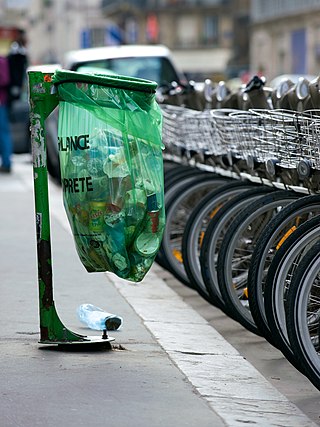
A bin bag, rubbish bag, garbage bag, bin liner, trash bag or refuse sack is a disposable receptable for solid waste. These bags are useful to line the insides of waste containers to prevent the insides of the container from becoming coated in waste material. Most bags today are made out of plastic, and are typically black, white, or green in color.
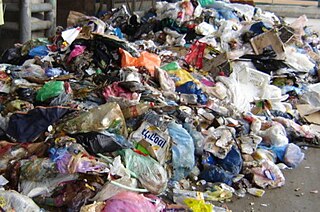
Municipal solid waste (MSW), commonly known as trash or garbage in the United States and rubbish in Britain, is a waste type consisting of everyday items that are discarded by the public. "Garbage" can also refer specifically to food waste, as in a garbage disposal; the two are sometimes collected separately. In the European Union, the semantic definition is 'mixed municipal waste,' given waste code 20 03 01 in the European Waste Catalog. Although the waste may originate from a number of sources that has nothing to do with a municipality, the traditional role of municipalities in collecting and managing these kinds of waste have produced the particular etymology 'municipal.'
Pay as you throw (PAYT) is a usage-pricing model for disposing of municipal solid waste. Users are charged a rate based on how much waste they present for collection to the municipality or local authority.
The Island Waste Management Corporation (IWMC) is a Canadian provincial Crown corporation operated by the Government of Prince Edward Island.
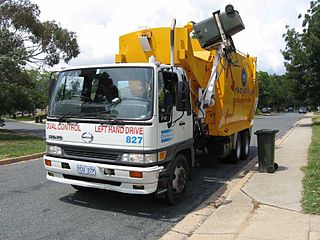
Kerbside collection or curbside collection is a service provided to households, typically in urban and suburban areas, of collecting and disposing of household waste and recyclables. It is usually accomplished by personnel using specially built vehicles to pick up household waste in containers that are acceptable to, or prescribed by, the municipality and are placed on the kerb.

Green waste, also known as "biological waste", is any organic waste that can be composted. It is most usually composed of refuse from gardens such as grass clippings or leaves, and domestic or industrial kitchen wastes. Green waste does not include things such as dried leaves, pine straw, or hay. Such materials are rich in carbon and considered "brown wastes," while green wastes contain high concentrations of nitrogen. Green waste can be used to increase the efficiency of many composting operations and can be added to soil to sustain local nutrient cycling.

Biodegradable waste includes any organic matter in waste which can be broken down into carbon dioxide, water, methane, compost, humus, and simple organic molecules by micro-organisms and other living things by composting, aerobic digestion, anaerobic digestion or similar processes. It mainly includes kitchen waste, ash, soil, dung and other plant matter. In waste management, it also includes some inorganic materials which can be decomposed by bacteria. Such materials include gypsum and its products such as plasterboard and other simple sulfates which can be decomposed by sulfate reducing bacteria to yield hydrogen sulfide in anaerobic land-fill conditions.

Biodegradable plastics are plastics that can be decomposed by the action of living organisms, usually microbes, into water, carbon dioxide, and biomass. Biodegradable plastics are commonly produced with renewable raw materials, micro-organisms, petrochemicals, or combinations of all three.

Waste sorting is the process by which waste is separated into different elements. Waste sorting can occur manually at the household and collected through curbside collection schemes, or automatically separated in materials recovery facilities or mechanical biological treatment systems. Hand sorting was the first method used in the history of waste sorting. Waste can also be sorted in a civic amenity site.

This article outlines the position and trends of recycling in Canada. Since the 1980s, most mid to large municipalities in most provinces have recycling programs, relying on curbside collection with either bins, boxes, or bags. These systems are not standardized, and the specific process differs for each province. Certain provinces have container-deposit systems in place for bottles, cans, and other beverage containers.
Toronto Solid Waste Management Services is the municipal service that handles the transfer and disposal of garbage as well as the processing and sale of recyclable materials collected through the blue box program in Toronto, Ontario, Canada.
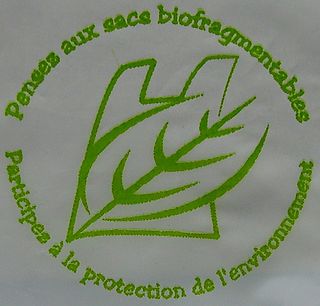
Biodegradable bags are bags that are capable of being decomposed by bacteria or other living organisms.
The Ontario Deposit Return Program (ODRP), also simply known as Bag it Back, is a regulation of the province of Ontario, Canada. Its purpose is to divert recyclable materials from landfill or low-quality recycling uses by charging a fee for each alcoholic beverage container sold in the province, and processing the material for re-use or other recycling activities once the containers are returned for a refund of the deposit fee. Customers forfeit the deposit fee if the container is not returned.
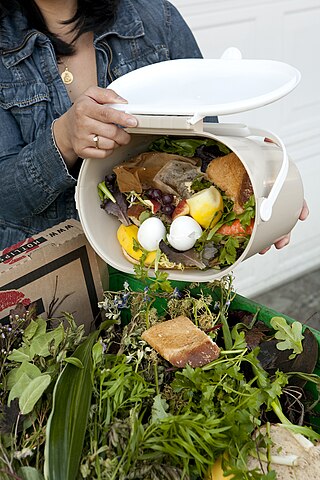
Source-separated organics (SSO) is the system by which waste generators segregate compostable materials from other waste streams at the source for separate collection.
The San Francisco Mandatory Recycling and Composting Ordinance is a local municipal ordinance requiring all persons located in San Francisco to separate their recyclables, compostables and landfilled trash and to participate in recycling and composting programs. Passed by the San Francisco Board of Supervisors in 2009, it became the first local municipal ordinance in the United States to universally require source separation of all organic material, including food residuals.
Resource recovery is using wastes as an input material to create valuable products as new outputs. The aim is to reduce the amount of waste generated, thereby reducing the need for landfill space, and optimising the values created from waste. Resource recovery delays the need to use raw materials in the manufacturing process. Materials found in municipal solid waste, construction and demolition waste, commercial waste and industrial wastes can be used to recover resources for the manufacturing of new materials and products. Plastic, paper, aluminium, glass and metal are examples of where value can be found in waste.
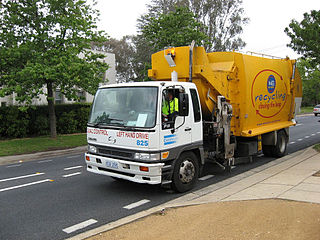
Recycling in Australia is a widespread, and comprehensive part of waste management in Australia, with 60% of all waste collected being recycled. Recycling is collected from households, commercial businesses, industries and construction. Despite its prominence, household recycling makes up only a small part (13%) of Australia's total recycling. It generally occurs through kerbside recycling collections such as the commingled recycling bin and food/garden organics recycling bin, drop-off and take-back programs, and various other schemes. Collection and management of household recycling typically falls to local councils, with private contractors collecting commercial, industrial and construction recycling. In addition to local council regulations, legislation and overarching policies are implemented and managed by the state and federal governments.

New York City's waste management system is a refuse removal system primarily run by the New York City Department of Sanitation (DSNY). The department maintains the waste collection infrastructure and hires public and private contractors who remove the city's waste. For the city's population of more than eight million, The DSNY collects approximately eleven thousand tons a day of garbage, including compostable material and recycling.
Home composting is the process of using household waste to make compost at home. Composting is the biological decomposition of organic waste by recycling food and other organic materials into compost. Home composting can be practiced within households for various environmental advantages, such as increasing soil fertility, reduce landfill and methane contribution, and limit food waste.













